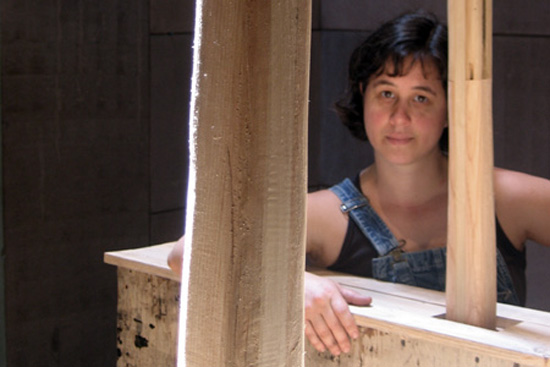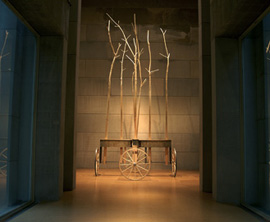Studio Arts Technician Keeps Arts Area Environmentally Friendly
 |
| Kate Ten Eyck, art studio technician for the Center for the Arts, teaches students how to properly use mechanical equipment. |
| Posted 09/06/07 |
| Early in life, Kate Ten Eyck developed a knack for understanding how things work. As a teen, she learned to fix cars, reconstructed a sewing machine and enthusiastically studied human anatomy. While she went on to pursue a career in the arts, she never lost her natural curiosity for mechanics.
In the Center for the Arts and the Art and Art History Department, where she has worked since 2000, Ten Eyck meshes her passions for art, teaching and technical problem solving in one position as art studio technician. One moment I could be talking with a student about artists who create work in line with that students interests, and the next, I could be fixing a drill press or mixing photo chemicals, she says. Since I understand both the artistic and technical sides of the arts, this position is a match made in heaven. Art students take full advantage of Ten Eycks abilities, and often ask her for advice on their projects. My favorite part of the job is when a student comes up to me and says, I want to build this, but I dont know how. I enjoy helping to teach students the skills they need to realize their creative potential, she says. Ten Eyck not only repairs machines, but also trains student artists how to use them properly and safely. Several years ago, she helped acquire a flesh-sensitive table saw, which stops in 3 milliseconds if a finger lingers a little too close to the blade. I can sleep better at night knowing we have this special machine, she says. She also teaches chemical hygiene and environmental health-related issues to students enrolled in art classes. Until recently, she explains, many artists were using materials that we now know to be potentially hazardous to a persons health. Here in the art facilities, we use ventilation, require protective clothing and in some cases phase materials out completely. Ten Eyck is always looking for ways to reduce and eliminate waste. For example, painting students now have a system to collectively recycle mineral spirits over and over again instead of disposing of them after one use. Wesleyan has been especially proactive when it comes to students health and caring for the environment, and our way of collecting hazardous wastes has improved dramatically, says Ten Eyck, who is a member of Wesleyans Sustainability Committee. The Art and Art History Department has also dramatically increased paper, cardboard and wood scrap recycling in the past three years. As an artist, Ten Eyck has worked in many different media, including drawing, sculpture, woodcuts, monotype printing, lithography and etching. She is a 1996 graduate of the Rhode Island School of Design and 2005 graduate of the Hartford Art School. She holds a bachelor of fine arts in sculpture and a master of fine arts in printmaking. Her artwork has been featured in galleries nationwide. Some highlights include a series of etchings depicting the ecology of parasites, welded steel shoes in the shape of chicken feet, and mechanically-moving table and chairs activated by motion detectors.
These are both sculptural vehicles and simple machines, and each represents my renewed interest in performance, tapping into my experience with dance, theater and music, she says, regarding her recent creations. Much of her theatrical interest stems from her experience working as Technical Director for Oddfellows Playhouse in Middletown after college. In the summer of 2007, she furthered her theatrical studies with an internship at the Bread & Puppet Theater in Glover, Vt. Largely through her experiences working with at-risk youth at Oddfellows, Ten Eyck discovered a personal devotion to young adults. In the past three years, she and her husband, pianist Noah Baerman, have become long-term foster parents to three teenagers, ages 14, 16 and 19. There is a severe shortage of foster and adoptive parents, especially for teens, says Ten Eyck. No child should have to grow up without a family. My girls are amazing, and this parenting journey has been the most gratifying experience of my life. More of Ten Eycks artwork can be seen on her website, http://www.kateteneyck.com/. A Quicktime video of Kate Ten Eyck’s piece, Carousel, can be viewed below. |
| By Olivia Drake, The Wesleyan Connection editor. Photos and videos contributed. |


 In May 2007, she was one of 10 Wesleyan artists featured in The Faculty Show, showing her ambitious latest work, Carousel. Ten Eyck considers herself a third generation tinker and says the piece was inspired by her father and late grandfather, both builders and inventors. Carousel,” pictured at right, is constructed of four wagon wheels, bark-peeled branches and a steel, crankshaft-like mechanism. Viewers are encouraged to interact with the piece. Saw Machine, another one of Ten Eycks three-dimensional, interactive sculptures, accompanied Carousel in the show.
In May 2007, she was one of 10 Wesleyan artists featured in The Faculty Show, showing her ambitious latest work, Carousel. Ten Eyck considers herself a third generation tinker and says the piece was inspired by her father and late grandfather, both builders and inventors. Carousel,” pictured at right, is constructed of four wagon wheels, bark-peeled branches and a steel, crankshaft-like mechanism. Viewers are encouraged to interact with the piece. Saw Machine, another one of Ten Eycks three-dimensional, interactive sculptures, accompanied Carousel in the show.